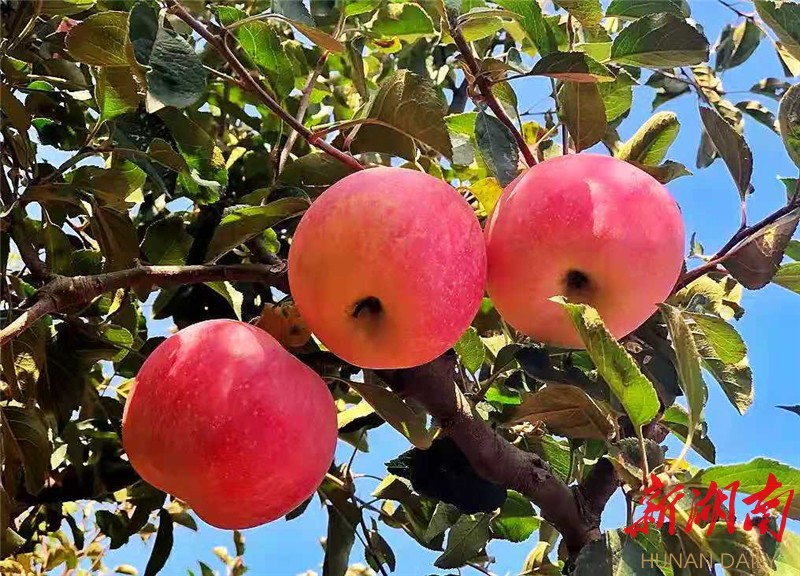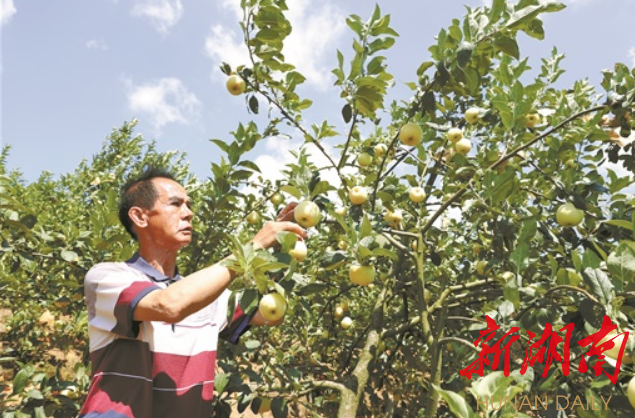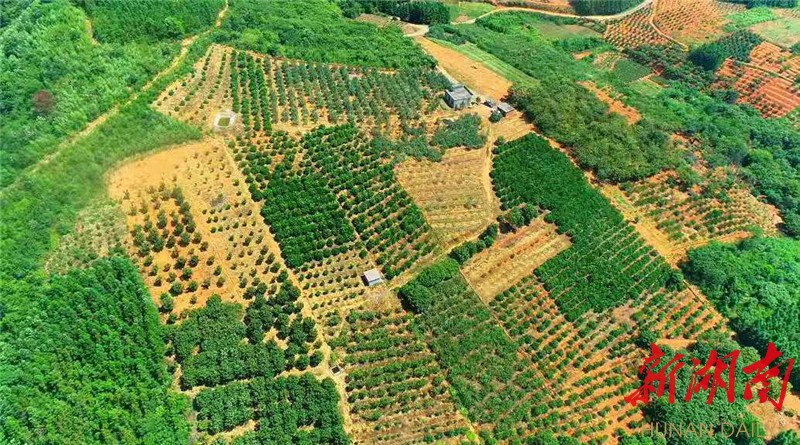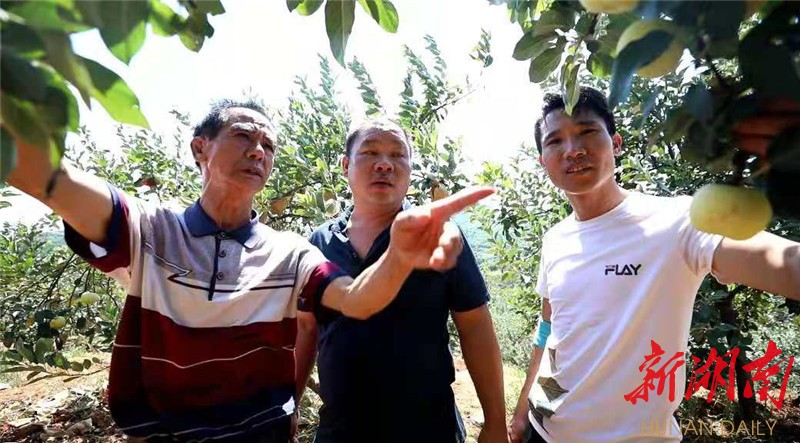Sweet apples grow in Guiyang
August is the ripe season for apples in Southern China. Apple trees are laden with fruits on a hillside at the Maxiangzu Apple Research Base in Tangxia Village, Fangyuan Town, Guiyang County. As the light breeze blows, the apples scent the air.

This is the core planting area of Guiyang Jindun Southern Apple Co., LTD. At the foot of a hill, a dark-skinned ordinary farmer, Yuan Guangming, who successfully planted apples generally grown in northern China on the land of southern China, was busy at work.
Poverty gives rise to the desire for change, said Yuan Guagming, who made a bold attempt to introduce apples to the south.
"At the foot of the opposite saddle-like mountain Maxiang lies, where rows of beautiful new houses have replaced previous adobe houses. Villagers here led a bitter life in the past as drought often hit the place," said an officer from the Economics and Science Bureau of Guiyang County.
The per capita farmland area in Maxiang became even smaller due to the land expropriation during the construction of Chenjia Railway in the 1980s.Then, the remaining 40 or more mu of farmland could hardly feed more than 50 families in the village.

In order to get rid of poverty, Yuan Guangming, the group leader at the time, called on the villagers to develop and utilize barren mountains, build water conservancy projects and reclaim wasteland to grow peaches, oranges, chestnuts, etc.
A few years later, the villagers were full of joy when the planted trees began to bear fruits. However, owing to the oversupply in the market, many fruits were backlogged on the trees and rotted, which worried the villagers a lot.
"We must plant fruits that are not available in the south to increase income, for peaches, oranges, and chestnuts are too common to sell at a high price." Yuan Guangming was thinking about this when he was sleepless at night.
"How about apples?"
"The climatic conditions in the south is quite different from that in the north, so the south is not suitable for apple growth." Many people threw cold water on Yuan.
"How do you know that without try? Once we grow it successfully, our income will increase by then." Yuan was resolved to develop characteristic fruits.
Yuan Guangming had a difficult time and did much work for this sweet southern apple.
In 1997, Yuan Guangming went to Shandong and Shanxi provinces for inspection and study.
In the spring of 1998, with the borrowed money Yuan bought 150 apple seedlings and planted them in the wasteland on the mountain under the assistance of his three sons. Living on the mountain, his palms grew calluses and his legs were often cut by brambles.
Three years later, the apple trees finally bore fruits, which, however, were in small number and tasted astringent, hard and sour when Yuan tried it expectantly.
"Don't waste your energy on the apple trees," Yuan's wife complained sadly when looking at his weather-beaten face.
"No, the failure is temporary. I believe big sweet apples can be developed through hardwork." Yuan Guangming was determined to find a way for the villagers to get rich.
"How can apples be planted in the south?" Some people advised Yuan Guangming to stop to find another way. But he remained determined.
Local tree species akin to apples were found to be grafted on apple trees.
Seedling cultivation is an important part of growing apples, so Yuan thought of the improvement on the original saplings in the process of apple introduction to the south. Inspired by the cross-pollination technology applied to pears and hybrid rice developed by Yuan Longping, Yuan Guangming, who analyzed that the former failure resulted from single variety, inferred that cross-pollination could improve the yield and quality of apples.

“To grow characteristic fruits, we must rely on scientific and technological means.” Though not well educated, Yuan insisted on subscribing to a variety of agricultural science and technology newspapers and magazines, and learned from books and skilled growers to improve his apple planting in practice.
Yuan dug into cross-pollination by grafting two new varieties of apple trees with existing ones. Another three years later, the yield of apples did increase, with an average output of more than 40 kg per tree.
Despite the high yield, the fruits were still hard, small, sour, and easy to fall off. In order to find out the reason, Yuan consulted apple growers in Shaanxi, Shanxi and other places and he finally figured out that local tree species akin to apples must be grafted with apple trees to improve the quality under the conditions of high temperature, high humidity and acid soil in the south.
Traveling through the mountains and forests around, Yuan successively selected wild begonia, toon and other tree species as the male parent, which were grafted at the roots of the apple trees. At the same time, high-position grafting of different varieties was used to continuously domesticate the sampling.
Most of his family's income was invested in grafting and domesticating apple saplings. Yuan was finally favored by Fortune for his unremitting efforts on grafting, domestication and the all-round selection in variety adaptability, scion and cultivation management methods. In 2006, when the news that he cultivated high-yield, crisp and sweet Kara green apples spread, many villagers came to have a look.
The road to scientific research is endless. In 2009, Yuan Guangming purchased red Fuji varieties from Shaanxi and Shanxi for grafting and domestication. In 2012, he cultivated the sweet and crisp "Southern Red II".
After the establishment of Guiyang Jindun Southern Apple Co., Ltd., good news came from the State Intellectual Property Office in 2014 that his “applicable method for cultivating apple saplings in southern Hunan and southern regions” obtained a national invention patent, which filled the technological gap that high-quality apples couldn't be grown in the south.
Modest and tough, Yuan Guangming persisted in research and has now cultivated 16 varieties such as Kara, Red Fuji and Dahongyun.
A high-quality southern apple seedling base was established to cultivate organic apples. New apple varieties have been promoted to 14 provinces in the southern of the country and even gone abroad.
"In the south, the apple trees bear fruits after three years’ growth. Long anti-season period and small supply lead to a relatively high price." Yuan Guangming introduced to the growers who came to learn experience.
At the Southern Apple Research Base, after tasting a sweet red apple, Deng Wenping, a tourist, purchased 40 kilograms of apples worth 800 yuan.

Today, the southern apple scientific research base has an area of 60 mu, with an annual output of nearly 30,000 kilograms. Yuan Guangming has also established a high-quality southern apple seedling base, which can grow more than 130,000 seedlings every year, and provide jobs for more than 200 villagers.
Today, southern apples have been extended to 14 southern provinces, including Hunan, Jiangxi, Zhejiang, and Hainan, with a planting area of more than 4,000 mu, and increased the income of more than 50,000 people.
Southern apples have also blossomed overseas. In April 2018, Lin Bingkun, a Chinese professor engaged in agricultural research in Nepal, introduced the southern apple to Nepal, where the trees are bearing fruits this year.
Never too old to learn. This year, 69-year-old Yuan Guangming cultivated “Southern red Ⅱ” , which is heat-resistant and pest-resistant, with the net weight of a single apple reaching 300 grams and will have a bright market prospect.
Under the scorching sun, Yuan watched closely the growth of the "Southern red Ⅱ", hoping to cultivate more high-quality varieties, so as to raise the income of more villagers.




